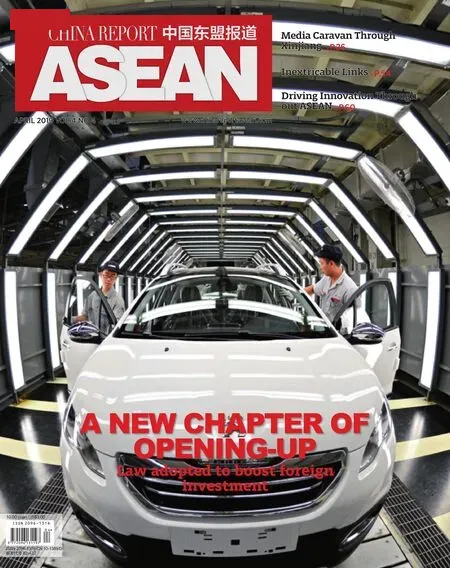GAN TIAN LOO:FOREIGN INVESTMENT LAW SENDING POSITIVE SIGNALS
By Wang Fengjuan
As a representative of the fourth generation of overseas Chinese, Dato Gan Tian Loo, vice president of the Malaysian Chinese Association(MCA), attended the First Session of the 13th CPPCC(Chinese People's Political Consultative Conference)National Committee in 2018 as a non-voting member. Although he was in Malacca when the Two Sessions took place in Beijing this year, he followed the developments closely, especially the adoption of the Foreign Investment Law.
Better Business Environment
“China's Two Sessions deserve special attention because they are related to planning for the current and future economic and social development of the country,”commented Gan. As China celebrates the 70th anniversary of the founding of the People's Republic, the country is making great strides to shift from “catching up with the times” to “leading development of the times.” China is preparing to host the second Belt and Road Forum for International Cooperation and the second China International Import Expo (CIIE) this year. Gan believes that the Two Sessions will result in positive signals of opening-up and create a better business environment for investors.
The Foreign Investment Law will replace the three existing laws—Law on Chinese-Foreign Equity Joint Ventures, Law on Foreign-Capital Enterprises and Law on Chinese-Foreign Contractual Joint Ventures—to be a basic law for foreign investment.
“This is an important step for China to implement its strategy of opening wider to the outside world,” said Gan.“I believe that foreign businesses are looking forward to its implementation.”
Gan believes that considering the huge productionconsumption market in China, adoption of the law will create a better business environment and help investors around the world more easily explore the Chinese market.In the current environment of global economic recovery,China's action will boost confidence in the market and inject new impetus into a more open market. Meanwhile,it will boost world economic growth and create a dynamic of complementarity and reciprocity between China and other countries.
Boosting Confidence

Dato Gan Tian Loo, vice president of the Malaysian Chinese Association.
“Adoption of the law will certainly boost the confidence of foreign investors,” declared Gan.He believes that nearly every world-renowned enterprise is looking for opportunities to invest in China. Adoption of the law at the Two Sessions is a manifestation of China's determination to open wider to the world, which will attract more foreign enterprises to participate in China's economic development. One of the clearest examples of this trend is the CIIE.
In terms of specific content of the law, it includes several articles that provide for fair competition. For example, Article 9 reads: “The state's various policies to support the development of enterprises shall equally apply to foreign-funded enterprises according to the law.”Article 14 states: “As needed for national economic and social development, the state encourages and directs foreign investors to invest in certain industries, fields and regions. Foreign investors and foreign-funded enterprises may enjoy preferences according to laws, administrative regulations, or the provisions issued by the State Council.”
“The provisions illustrate the country's determination to guarantee fair competition,” commented Gan. He also hopes that with the gradual improvement of the business environment, China will enhance its abilities in production, operation and scientific innovation in the global market and promote rapid development of the world economy.
As an overseas Chinese businessman, Gan has paid special attention to measures emerging from the Two Sessions to bring together the wisdom and resources of the overseas Chinese community.
Last year, China celebrated the 40th anniversary of reform and opening-up. Overseas Chinese people overwhelmingly take pride in the achievements made by their country of origin and warmly welcome the Chinese government's policies and measures to promote international economic cooperation and people-to-people exchanges.

